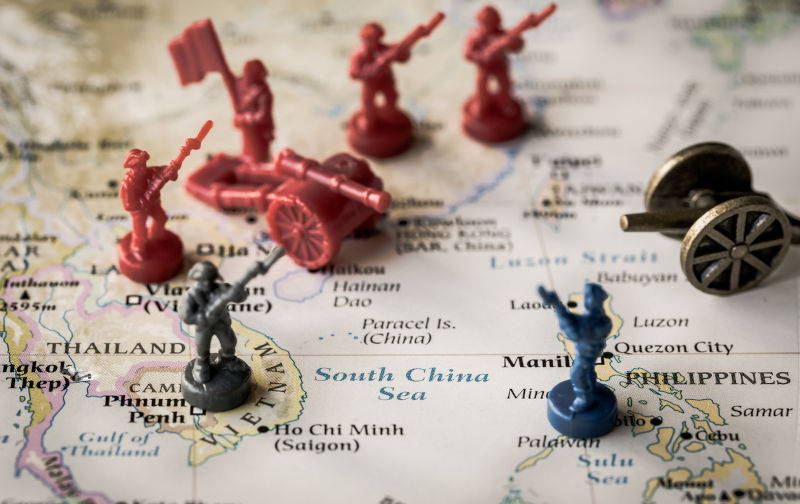We’ve all heard the ‘rules-based order’ catchphrase a lot and Australia has historically been a great supporter, championing the major international institutions at the time of their establishment.
In recent years, we have joined the refrain that this international order represents the agreed rules of the road, and there’s no reason to alter it. Sounds all well and good. Now let’s look at what’s happening in the South China Sea. Five countries that face on to the South China Sea have overlapping maritime claims. As is well known, China has the greatest means of realising those claims.
What is Australia doing about it? Are we championing a negotiated outcome that will result in a binding multilateral agreement, as you would expect in a rules-based order? Not on your life. Instead, we are opting to tag along with the United States who are doing what they do best: strutting around the area with guns loaded.
Given that Australia’s only interest in the area is that our maritime trade continues to flow through it, one would think that we would be keenly interested in a peaceful lowering of tensions because the one thing that is guaranteed to disrupt shipping through the area would be a hot conflict. Yet we seem determined to press on with heightening tensions rather than lessening them.
An actual rules-based order solution
Australia’s solution-oriented diplomatic messaging is completely missing in action with respect to the South China Sea, leaving the space open for containment and confrontation rhetoric. I’m going to suggest a solution that is available right now and would resolve the issue.
The first thing to keep in mind about the South China Sea is that no one lives there. These are arguments about uninhabited islets. So, in that respect, let’s get a grip. No one’s life is going to be changed based on who ‘owns’ the various atolls. The argument is about fishing rights and about the symbolic extent of national borders. Yes, there are gas and oil reserves but, in a rapidly decarbonising world, those become less significant by the year.
We have a template of how to manage such a situation that has worked without incident for more than sixty years: the Antarctic Treaty (AT). Antarctica is also uninhabited. Prior to the signing of the AT, seven countries including Australia had overlapping claims to it, notably including the Antarctic Peninsula which was claimed by Chile, Argentina and the United Kingdom. The parties to the Treaty agreed to ‘freeze’ all claims and not push any proprietary interest to the exclusion of each other. It was a brilliant solution. So today, you can go to school in Chile and be presented with a textbook that shows Chilean territory extending all the way to the South Pole. On the other side of the Andes, schoolchildren in Argentina see Argentinian territory extending through the same area. No one cares, because the claims are not enforced. All seven countries, and others besides, have bases established in the Antarctic, and not necessarily within their historical claim area. Critically, the AT requires that Antarctica remain a demilitarised zone, so there’s no reason to worry about the strategic significance of said bases. Notwithstanding that AT parties have come into conflict (Argentina and the United Kingdom), the conflict was never about their Antarctic claims and did not stray into that part of the world.
What about the management of resources? In the case of Antarctica there is a Protocol Annex to the Treaty, signed in 1991, that essentially declares the entire continent to be a nature preserve and forbids any exploitation of natural resources. This outcome seems highly unlikely to be applied in the South China Sea but, nonetheless, it demonstrates that the parties to a South China Sea Treaty could come to an agreement about the management of resources.
So there is a workable, off-the-shelf, solution to the current issues in the South China Sea that has stood the test of time. Australia could be using its diplomatic and political might to encourage parties towards this resolution, in the interest of peace and stability. That’s what we could be doing. But no, we aren’t pushing for negotiated solutions. Instead, we are joining with the Americans in practicing hostile beach landings.

Michael Walker
Dr Michael Walker works in the Justice and Peace Office of the Catholic Archdiocese of Sydney. He teaches at Australian Catholic University.
